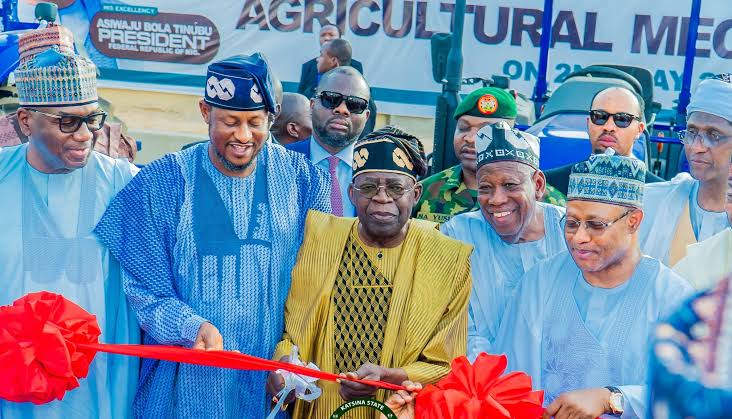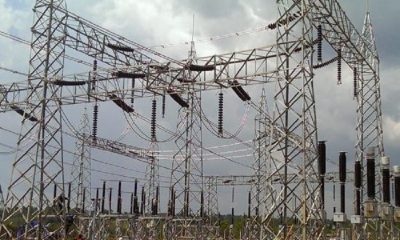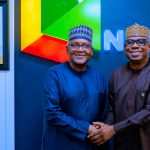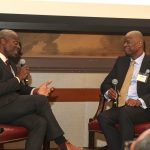Feature/OPED
FG’s Assurance on Generation of 25,000MW Electricity

By Jerome-Mario Chijioke Utomi
Understandably, the major factor, says a report, that daily abbreviates the seriousness with which communication from public officials/offices are taken by the people is that generality of such information often makes the grade of ‘self-undermining’.
They are recurrently reputed for encouraging complacency as constituents perceive issues raised by the government has already been handled or the priority often always not in conformity with the will/opinion of the people on the action later taken.
As expected, similar feelings greeted the recent reassurance by the Minister of Power, Mr Abubakar Aliyu, that the federal government was ready to generate 25,000 megawatts of electricity in the country.
The Minister disclosed this in Katsina State recently during his inspection of several power transmission substation projects, including the ongoing windmill project located at Lambar Rimi in Charanchi Local Government Area of the state as part of efforts to enhance power-related businesses and other economic activities in the country.
Without any shadow of the doubt, the assurance by the Minister is by no means political and would have, for obvious reasons elicited some level of excitement among Nigerians. If not for any other reason, the power sector as we all know remains very critical to meeting our industrial development aspirations and power is especially important because many artisans have been thrown out of work while many manufacturing and textile companies closed shop due to epileptic power supply.
It affects the survival of humanity, our nation. After all, any nation, according to Barack Obama, former United States of America (USA) that cannot control its energy sources can’t control its future.
The validity of the above statements and the strategic role that electricity plays in the socio-economic development of any nation notwithstanding, Nigerians are no longer moved by such promise/assurance coming from the federal government in this direction.
What they anticipate from the government is no longer assurance but action, progress and result. In fact, in the estimation of many, the challenge of epileptic power supply in Nigeria can easily be likened to the proverbial cat with nine lives that have survived different administrations.
Nigerians are particularly not happy that instead of generating megawatts of electricity, successive administrations, including the present federal government, have become reputed for generating megawatts of assurances devoid of process and outcome fairness.
They (Nigerians) are now in agreement that the culture of promises when it comes to electricity generation and improvement by successive administrations now qualifies as a familiar music hall act.
This challenge is by no means President Buhari’s administration-specific. Rather, for those that followed the trend since 1999 when democracy re-emerged on the political geography called Nigeria.
Let’s cast a glance at some of these past developments/promises.
In 2005, the government of former President Olusegun Obasanjo, going by media reports, attempted to solve the power problem with the Power Reform Act which provided for the privatization of the power sector.
As part of that reform, the then National Electric Power Authority (NEPA), which was renamed Power Holding Company of Nigeria (PHCN), was to be unbundled for privatization. But the reform did not go far before Obasanjo left office in 2007. But before then, a report observed that he had sunk $16 billion into the NIPP without anything to show for it
Before the dust raised by such colossal waste and phantom promise could settle, President Goodluck Ebele Jonathan (GEJ) in 2010 came up with a similar roadmap for electricity reform in the country.
During the launch of the programme, Mr Jonathan even boasted saying; “As President and Commander-in-Chief of the Armed Forces, I and my Vice President, Arc. Namadi Sambo, GCON, is conscious that what we do with the Nigerian electricity supply industry will go a long way in determining whether Nigeria remains in darkness or joins the rest of the world in the race for development.
“Our commitment is to bring an end to our nation’s stunted growth and usher in the fresh air of prosperity by pursuing a new era of sector-wide reform which is driven by improved service delivery to every class of customers in the Nigerian electricity sector. Promising that with diligent implementation and meticulous application of what this Roadmap provides, we will see an end to the chronic electrical power supply shortages.”
Again, to lend credence that Jonathan’s electricity roadmap was on course, Professor Chinedu Nebo, the then Minister of Power, in 2013 told Nigerians and the entire world that President Jonathan’s power sector privatization process was on and already.
Successful bidders, he said, had paid 25 per cent of the bid-offer. They are expected to pay the remaining 75 per cent in less than 90 days after which they would take possession of the distribution companies. Also, Nebo going by reports had said that the handing over of the national integrated power projects, NIPP, would make power supply more stable soon.
Regrettably, as at the time of his departure from office in May 2015, there were neither traces of appreciable increase in power generation or the promised fresh air of prosperity.
In 2015, the All Progressives Congress (APC) led the federal government emerged.
The party had in the previous year, as part of its draft manifesto, promised to revitalize the nation’s power/energy sector. According to the party, its power supply programme would vigorously pursue the expansion of electricity generation and distribution up to 40,000 megawatts in four to eight years. The party would also work assiduously at making available power from renewable energy sources such as coal solar, wind and biomass for domestic and industrial use, wherever they are visible.
In the year 2020, President Muhammadu Buhari led federal government, sequentially launched a roadmap for the nation’s power sector.
Without going into specific concepts or approaches contained in that move, the roadmap which according to government sources form a part of the outcome of meeting President Muhammadu Buhari held with a German Chancellor, Angela Merkel on August 31, 2018, will have Nigeria partner with the German government and Siemens, in implementing projects geared towards resolving challenges in the sector, expand capacity for future power needs and supply in Nigeria.
To continue with the season/culture of promise/excuses that have in the past ‘produced monument of nothingness’, President Buhari during a nationwide broadcast on June 12, 2020, among other things stated; “The power sector remains very critical to meeting our industrial development aspirations and we are tackling the challenges that still exist in the delivery of power through different strategies.
“We are executing some critical projects through the Transmission Rehabilitation and Expansion Programme including the: Alaoji to Onitsha, Delta Power Station to Benin and Kaduna to Kano, 330KV DC 62KM line between Birnin Kebbi and Kamba, Lagos/Ogun Transmission Infrastructure Project, Abuja Transmission Ring Scheme, and Northern Corridor Transmission Project. Our agreement with Siemens will transmit and distribute a total of 11,000 Megawatts by 2023, to serve our electricity needs.”
Today, both the nation and the administration are yet to depart that season of promise/reassurance.
Certainly, while I believed and still believe in the FG’s effort to ensure stable electricity in the country, the truth must be told to the effect that the whole gamut of failures is standing on the tripod of corruption, policy summersault and lack of sincere political will/desire by the nation’s handlers to engage best minds to help get the answers and deploy the resources we need to move the sector in the right direction while achieving the result we need as a nation.
This piece further holds the opinion that at the most basic level, it is evident that what Nigerians need is the result, not assurance or reassurance; they want to see and enjoy stable electricity supplied at a very reasonable tariff regime. Outside this, this season of doubt will continue.
Jerome-Mario Chijioke Utomi is the Programme Coordinator (Media and Public Policy), Social and Economic Justice Advocacy (SEJA), Lagos. He could be reached via jeromeutomi@yahoo.com/08032725374.
Feature/OPED
Nigeria’s Bold Strides Towards a Sustainable Future

By Alex Oware
President Bola Tinubu has firmly established Nigeria as a proactive and visionary leader in the global pursuit of climate action and sustainable development. Recognising that environmental stewardship is intrinsically linked to economic prosperity, his administration has moved beyond viewing climate change as a mere ecological concern, positioning it instead as a pivotal economic opportunity ripe for exploration and investment.
President Tinubu’s emphatic pronouncements at the 2025 Abu Dhabi Sustainability Week and during a high-level virtual dialogue underscored Nigeria’s unwavering commitment to international collaboration, emphasising the critical need for a unified global response to the escalating climate crisis. He astutely highlighted that the realisation of a truly sustainable future necessitates robust global interconnectedness and a shared sense of responsibility amongst all nations.
Nigeria’s comprehensive strategy for tackling the multifaceted challenges of climate change rests upon three fundamental pillars: a decisive shift towards clean energy transition, the building of robust climate resilience, and an overarching commitment to sustainable development. To translate these core principles into tangible realities, the current administration is actively implementing a range of key initiatives designed to wean the nation off its reliance on traditional fossil fuels.
A significant aspect of this endeavor involves the substantial expansion of infrastructure to support the widespread adoption of Compressed Natural Gas (CNG) and electric vehicles. Simultaneously, the government is strategically focusing on harnessing Nigeria’s abundant solid mineral resources to provide crucial materials for the burgeoning green energy sector.
Complementing these efforts are the implementation of climate-smart agricultural practices, aimed at simultaneously enhancing national food security and minimising detrimental environmental impacts.
Furthermore, the newly introduced National Clean Cooking Policy seeks to promote clean energy solutions at the household level, promising significant environmental, health, and socio-economic benefits for Nigerian citizens.
These ambitious endeavors are meticulously designed to deliver palpable value and positive impact directly to the lives of Nigerians. The diversification of energy sources holds the promise of cleaner air and a significantly healthier environment for communities across the nation.
The active promotion of CNG as a viable alternative fuel is strategically aimed at mitigating the economic and social hardships that have arisen from the removal of fuel subsidies, offering a more affordable and sustainable energy option for transportation and domestic use. The widespread adoption of climate-smart agriculture is paramount for bolstering food security, ensuring a stable and reliable food supply, and safeguarding vulnerable local communities from the increasingly severe adverse effects of climate change, such as droughts and floods.
Moreover, the deliberate expansion of the green energy sector is projected to generate a wealth of new employment opportunities and empower local entrepreneurs, particularly in rural communities that are gaining access to reliable and sustainable electricity for the first time.
In a demonstrably bold move that underscores the administration’s commitment to these overarching goals, President Tinubu’s government has put forward a significant N10 billion solar power project specifically for the Aso Rock Presidential Villa. This ambitious initiative is presented as a crucial step towards establishing a more sustainable and dependable energy future for the entire nation, starting from the highest levels of governance.
Proponents of the project persuasively argue that it aligns seamlessly with global best practices, drawing parallels with the increasing adoption of solar energy in key government institutions worldwide. The Energy Commission of Nigeria (ECN) has vigorously defended the project, asserting that it is fully in line with President Tinubu’s broader reforms aimed at fundamentally transforming Nigeria’s energy landscape and decisively tackling the persistent and crippling energy debt crisis.
The ECN further emphasises that solar energy offers inherent efficiency, provides a crucial shield for Nigerians against the volatility of rising tariffs on conventional energy sources, and has the potential to significantly ease the immense pressure currently burdening the national electricity grid.
While the project has understandably sparked public debate and scrutiny regarding its substantial cost and prioritisation in the face of other pressing national needs, the government strategically positions it as an innovative approach that demonstrates leadership by example and a profound commitment to integrating clean energy solutions at the very apex of Nigerian governance.
Beyond these crucial domestic initiatives, President Tinubu has actively and strategically sought robust international collaboration and support for Africa’s complex transition towards a green economy, fully acknowledging that the necessary investments are inherently capital-intensive.
Nigeria has already demonstrated commendable leadership on the continental stage by being the first African nation to successfully launch Sovereign Green Bonds, specifically designed to finance environmentally sustainable projects across various sectors.
Furthermore, the country is actively in the process of developing a comprehensive Global Climate Change Investment Fund, with the primary aim of attracting substantial further investment in critical green infrastructure and innovative clean energy initiatives.
Nigeria remains steadfast in its commitment to achieving net-zero greenhouse gas emissions by the ambitious target year of 2060 and is actively engaged in the crucial process of updating its Nationally Determined Contributions (NDCs) under the esteemed UN Framework Convention on Climate Change.
The recent finalisation of the Nigeria Carbon Market Activation Policy in March 2025 is projected to unlock a substantial potential of up to $2.5 billion in valuable carbon credit investments by the pivotal year of 2030. This influx of capital is expected to further bolster climate-aligned economic growth and create new avenues for sustainable development.
Moreover, Nigeria is actively collaborating with various United Nations agencies to develop a comprehensive guideline for a just transition towards a fully decarbonised economy. This crucial collaboration ensures that the inevitable shift towards clean energy and climate-resilient solutions is implemented in a manner that leaves no community or economic sector behind, prioritising the creation of green jobs, the development of essential skills, and comprehensive capacity-building initiatives across the nation.
President Tinubu’s overarching strategy underscores a holistic and integrated approach that seamlessly weaves climate action into Nigeria’s broader development agenda, recognising it not as a separate concern but as a fundamental strategic imperative for sustained economic growth and comprehensive national transformation.
By diligently pursuing these comprehensive and interconnected strategies, Nigeria aims not only to effectively address the urgent and pressing challenges posed by climate change but also to unlock significant and lasting economic and social benefits for all its citizens, paving a clear and sustainable pathway towards a resilient, equitable, and prosperous future for generations to come.
Alex Oware is the Regional Director for YP4T
Feature/OPED
Navigating the Maze: Solutions for Nigeria’s Flourishing Foodtech Industry

By Diana Tenebe
Nigeria’s foodtech sector holds immense promise to transform our nation’s food production, distribution, and consumption systems. However, this burgeoning industry currently navigates a complex maze of challenges that could significantly hinder its progress.
While innovation and entrepreneurial drive are abundant, a confluence of infrastructural deficits, economic headwinds, technological disparities, and logistical complexities casts a shadow on the sector’s long-term viability.
Understanding and addressing these multifaceted hurdles is paramount for foodtech companies aspiring to thrive and contribute meaningfully to Nigeria’s food security.
One of the most significant impediments to the foodtech sector’s advancement is Nigeria’s persistent infrastructural weaknesses. The unreliable power supply, a well-known constraint for businesses nationwide, directly threatens food preservation, increasing spoilage risks and driving up operational costs for companies reliant on refrigeration and consistent processing.
Similarly, the often-deteriorated state of our road networks complicates logistics and transportation, hindering the efficient movement of goods from farms to consumers and across the supply chain.
Furthermore, limited access to clean water exacerbates operational challenges, particularly for maintaining food processing and hygiene standards. Collectively, these infrastructural shortcomings inflate operational expenses and introduce vulnerabilities throughout the food supply chain.
Economic constraints add another layer of intricacy. Fluctuations in currency exchange rates create instability in pricing and procurement, especially for businesses dealing with imported technologies or ingredients. Persistent inflation erodes consumer purchasing power and increases the cost of essential inputs, squeezing profit margins for startups.
Moreover, limited access to credit and investment capital makes it difficult for emerging foodtech companies to secure the necessary funding to invest in crucial technology, infrastructure, and expansion efforts. This financial constraint can stifle innovation and prevent promising ventures from reaching their full potential.
The digital divide also poses a unique challenge for foodtech companies aiming to leverage online platforms and digital solutions. While mobile phone usage is widespread in Nigeria, disparities in digital literacy and access to reliable internet connectivity can restrict the widespread adoption of online food ordering and delivery services, particularly in rural and underserved communities. This necessitates creative and inclusive strategies to bridge the digital gap and reach a broader consumer base.
Inefficiencies within the supply chain represent a critical bottleneck in the Nigerian food system. Fragmented agricultural supply chains, characterised by numerous intermediaries and a lack of transparency, contribute to alarmingly high post-harvest losses.
Inadequate storage facilities and inefficient transportation infrastructure further compound these issues, leading to significant waste and price volatility. Addressing these systemic weaknesses is crucial for ensuring a stable and affordable food supply for all Nigerians.
Navigating Nigeria’s regulatory landscape can also be a daunting task for foodtech businesses. The presence of multiple regulatory agencies, coupled with often bureaucratic and time-consuming processes for obtaining licenses and permits, can create significant hurdles for startups. Clear, consistent, and streamlined processes within the regulatory framework are essential to foster a more enabling environment for innovation and growth.
Building consumer trust and acceptance for new food technologies requires overcoming inherent skepticism and unfamiliarity. Concerns regarding food safety, quality, and the security of online transactions can hinder the adoption of novel food products and digital platforms. Transparent communication, robust quality control measures, and consistent consumer engagement are vital for building confidence and fostering widespread acceptance.
Finally, a notable talent gap exists within the Nigerian foodtech ecosystem. A shortage of professionals possessing specialised skills in food science, technology, business management, and logistics can limit the growth and innovation capacity of companies in this sector. Addressing this skills deficit through targeted training and development initiatives is crucial for long-term success.
Despite these significant challenges, promising pathways forward can be forged through innovative and context-specific approaches. Investing in localised infrastructure solutions, such as independent power generation and efficient localised logistics networks, can mitigate the impact of broader infrastructural deficiencies.
Exploring diverse funding avenues beyond traditional banking, including angel investors, government grants, crowdfunding, and revenue-based financing, can alleviate financial constraints.
Adapting to the digital divide by leveraging basic mobile technology and employing offline strategies like local agent networks can expand reach and inclusivity. Building resilient supply chains through direct farmer relationships, investing in aggregation centres, and utilising technology for farm management offer tangible solutions to logistical inefficiencies.
Proactive engagement with regulatory bodies and advocating for clearer, more supportive policies are crucial for navigating the regulatory landscape effectively. Building consumer trust necessitates transparent sourcing practices, clear communication about product benefits and safety, and active engagement with consumer feedback.
Finally, investing in talent development through collaborations with educational institutions and in-house training programs can bridge the critical skills gap.
Foodstuff Store is emerging as a business with a clear vision to directly confront several of these challenges. We are actively developing a decentralised network of businesses supported by strategically located distribution hubs across target states. This approach will directly address the limitations imposed by poor road networks, ensuring more localised access to our food products.
Furthermore, the establishment of regional storage facilities, including a state-of-the-art solar-powered cold storage, directly tackles infrastructural deficiencies related to food preservation and ensuring a consistent supply.
Foodstuff Store’s ambition for end-to-end management of the food supply chain, encompassing in-house production, direct sourcing, advanced storage solutions, and efficient distribution, offers a powerful solution to existing supply chain inefficiencies.
This integrated approach promises enhanced quality control, significant reductions in post-harvest losses, and a more reliable supply of both perishable and non-perishable goods for our customers.
Our aspiration to become the “Amazon for Food Products” is a clear and ambitious goal underpinned by a technology-driven approach to all aspects of our operational management. Foodstuff Store’s vision underscores a business model strategically designed to overcome significant hurdles within the Nigerian foodtech sector, offering a beacon of potential and a pathway to a more secure and efficient food system in a challenging yet remarkably promising landscape.
By Diana Tenebe is the Chief Operating Officer of Foodstuff Store
Feature/OPED
President’s Katsina State Visit Exposes Disconnect from People’s Needs

By Abba Dukawa
The recent visit by the President Bola Tinubu to Katsina State has sparked concerns about the disconnect between the government’s priorities and the people’s needs. The visit exposed the hypocritical approach to the need of their people, states and the northern Nigeria as whole. The quality of leadership in the region has been questioned, with allegations of self serving interest, ineptitude, and a lack of vision.
This is in spite of the fact that northern Nigeria as a whole faces numerous challenges that threaten its stability and development. Some of the key issues include insecurity, poverty, education, economic hardship, inequality and social and cultural challenges. The visit has been seen as an opportunity missed to engage with the state’s residents, listen to their concerns, and chart a way forward for development.
While the visit was marked by displays of pageantry and entertainment, the state’s pressing issues such as insecurity, poverty, and economic hardship, seemed to take a backseat. Critics argue that the government’s focus on superficial events rather than addressing the root causes of the state’s challenges is a clear indication of a disconnect from the people’s needs.
The introduction of Rarara’s wife to the President by the Katsina State Governor, contravening cultural and religious norms, raise questions about leaders’ priorities and values.
Current leaders in the north seem more focused on personal interests and political survival than advocating for the northern Nigeria improvement.
Regardless of the challenges in the region the Governors keep praise for the President’s economic reforms, notwithstanding the region’s struggles, is concerning. economic reforms should lift people out of poverty, create jobs, and stimulate growth. If not yielding tangible benefits, they need reevaluation.
The north needs leaders prioritizing regional development and working towards a brighter future. Leaders understanding our region’s problems and committed to tackling them head-on are crucial. It’s time for a shift in approach, prioritizing people’s needs over personal interests.
As we move forward, we must demand more from our leaders. We need leaders who will stand up for the north and work tirelessly to find solutions. Anything less is a disservice to the region and its people.
We need leaders who cultivate a culture of good governance, prioritizing accountability and transparency to address insecurity and promote development.
The north needs a visionary leaders who prioritize all citizens’ needs, regardless of tribe or religion, are crucial for unity and stability.
Leaders who accelerate economic development, create jobs, and provide essential services like education and healthcare can reduce poverty and insecurity.
We require leaders who will combat corruption and promote social justice, reducing inequality and fostering stability.
In northern Nigeria, effective security reforms are necessary, including modernizing security agencies, enhancing intelligence gathering, and addressing insecurity’s root causes to ensure public safety.
To bridge the gap between the government and the people, there is a need for leaders who understand the intricacies of the state’s problems and are committed to tackling them head-on. By prioritizing the people’s needs and working towards sustainable development, the government can build trust and foster a sense of ownership among its citizens
May God guide Nigeria towards true development and prosperity.
Dukawa, a concerned Nigerian, can be reached at abbahydukawa@gmail.com
-

 Feature/OPED5 years ago
Feature/OPED5 years agoDavos was Different this year
-
Travel/Tourism9 years ago
Lagos Seals Western Lodge Hotel In Ikorodu
-

 Showbiz2 years ago
Showbiz2 years agoEstranged Lover Releases Videos of Empress Njamah Bathing
-

 Banking7 years ago
Banking7 years agoSort Codes of GTBank Branches in Nigeria
-

 Economy2 years ago
Economy2 years agoSubsidy Removal: CNG at N130 Per Litre Cheaper Than Petrol—IPMAN
-

 Banking2 years ago
Banking2 years agoFirst Bank Announces Planned Downtime
-

 Sports2 years ago
Sports2 years agoHighest Paid Nigerian Footballer – How Much Do Nigerian Footballers Earn
-

 Technology4 years ago
Technology4 years agoHow To Link Your MTN, Airtel, Glo, 9mobile Lines to NIN















